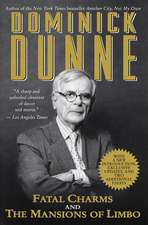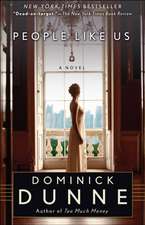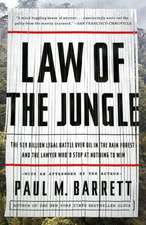Justice: Crimes, Trials, and Punishments
Autor Dominick Dunneen Limba Engleză Paperback – 30 apr 2002
With new essay, “Mourning In New York,” about September 11, 2001.
Preț: 115.83 lei
Nou
Puncte Express: 174
Preț estimativ în valută:
22.16€ • 23.70$ • 18.48£
22.16€ • 23.70$ • 18.48£
Carte disponibilă
Livrare economică 27 martie-10 aprilie
Preluare comenzi: 021 569.72.76
Specificații
ISBN-13: 9780609809631
ISBN-10: 0609809636
Pagini: 448
Dimensiuni: 134 x 205 x 25 mm
Greutate: 0.32 kg
Ediția:Pbk.
Editura: BROADWAY BOOKS
ISBN-10: 0609809636
Pagini: 448
Dimensiuni: 134 x 205 x 25 mm
Greutate: 0.32 kg
Ediția:Pbk.
Editura: BROADWAY BOOKS
Notă biografică
Dominick Dunne is the author of several bestselling novels, two collections of essays, and, most recently, The Way We Lived Then, a memoir with photographs. He is Special Correspondent for Vanity Fair and lives in New York City and Hadlyme, Connecticut.
Extras
Justice:
A Father's Account of the Trial of His Daughter's Killer
It was the beginning of a long hot summer. I flew to Los Angeles on July 5, 1983, for an indefinite stay. Throughout the flight from New York I engaged in diligent conversation with the stranger next to me, postponing as long as possible facing the feelings of dread within me. My two sons, Griffin and Alex, had preceded me out from New York. Alex, the younger one, met me at the airport, and we drove into Beverly Hills to the house where my former wife, Ellen Griffin Dunne, called Lenny, lives. Griffin was already there. It is not the house we lived in as a family. It is smaller and on one level. Lenny has multiple sclerosis and is confined to a wheelchair. We were gathering, a family again, for a murder trial.
The first time I saw Lenny she was getting off a train at the railroad station in Hartford, Connecticut. She was ravishing, and I knew that instant that I would marry her if she would have me. We had a large wedding at her family's ranch in Nogales, Arizona, in 1954, and after living briefly in New York, we moved to Beverly Hills, where I worked for twenty-five years in television and films. We had five children, two of whom died when they were only a few days old. Long divorced, we have, rightly or wrongly, never become unmarried. Often I have felt through the years that our lives might have been better if we had just stuck out the difficult years of our marriage, but I do not know if she would agree with that. We never venture into the realm of what might have been. I refer to her in conversation as my wife, never my ex-wife, and there is not a day in which she does not occupy my thoughts for some period of time. We communicate regularly and mail each other clippings we cut out of newspapers, and I no longer resent, as I once did, addressing her as Mrs. E. Griffin Dunne rather than as Mrs. Dominick Dunne.
When the telephone in my New York apartment woke me at five o'clock in the morning on October 31, 1982, I sensed as I reached for the receiver that disaster loomed. Det. Harold Johnston of the Los Angeles Homicide Bureau told me that my twenty-two-year-old daughter, Dominique, was near death at Cedars-Sinai Medical Center. I asked him if he had notified my wife. He said he was calling from her home. Lenny got on the phone and said, "I need you."
"What happened?" I asked, afraid to hear.
"Sweeney," she answered.
"I'll be on the first plane."
I called Griffin, then twenty-seven, who lives two blocks away from me in New York, and within minutes he was at my door. He called TWA and reserved a seat on the next flight. Then he went to an automatic teller machine and got me money. As I threw clothes into a suitcase, I hesitated over my black suit and tie, thinking they might be bad luck, but I packed them. Before I got into the taxi, I hugged Griffin and kissed him. He was to go then to the apartment of my second son, Alex, and break the news to him. Uniquely individual, Alex chose to live with no telephone on Pitt Street in a relatively inaccessible part of New York. Only Alex, of the four of us, had voiced his dislike of John Sweeney when Dominique introduced him into our lives.
She had brought him to New York several months earlier for the boys and me to meet. Dominique was a successful young television actress, who had just made her first major feature film, Poltergeist. Sweeney was the head chef at Ma Maison, a West Hollywood restaurant so concerned with its fashionable image that it had an unlisted telephone number to discourage the hoi polloi from entering its portals. We watched an episode of the television series Fame in which Dominique was the guest star, and then went out to dinner. At one moment when the four of us were alone, the boys teased Dominique about marriage, and she said, oh no, she was not getting married, and I knew she meant it. I was relieved, for although I could see Sweeney was excessively devoted to her, there was something off-putting about him. That night I phoned her mother and said, "He is much more in love with her than she is with him," and Lenny said, "You're absolutely right."
The next morning Alex told me of an incident that had occurred in P.J. Clarke's after I left them. While Sweeney was in the men's room, a man at the bar recognized Dominique as the older sister in Poltergeist and called out one of her lines from the film: "What's happening?" Dominique screams that line when evil spirits start to take over her home and cause frightening things to happen. A film clip of that scene has been shown so often on television that the line was familiar to people all over the country. There was no flirtation; it was the case of a slightly tipsy fan delighted to be in the presence of an actress he had seen in a film. But when Sweeney returned to the table and saw the man talking to Dominique, he became enraged. He picked up the man and shook him. Alex said that Sweeney's reaction was out of all proportion to the innocent scene going on. Alex said he was scary.
The following day I arrived a few minutes late at Lutèce, where I was meeting Dominique and Sweeney for lunch. They had not yet arrived, so I sat at a table in the bar to wait for them. I finished one Perrier and ordered another, and was beginning to think there had been a misunderstanding about either the time or the place when they entered the restaurant. It was a hot summer day, and Dominique looked marvelous in a starched white organdy dress, very California-looking. I was immediately aware that she had been crying, and that there was tension between them.
The chef made a great fuss over Sweeney. There was kissing on both cheeks, and they spoke together in French. At the chef's suggestion we ate the spécialité of the day, whatever it was, but the lunch was not a success. I found Sweeney ill at ease, nervous, difficult to talk to. It occurred to me that Dominique might have difficulty extricating herself from such a person, but I did not pursue the thought.
On the Fourth of July the three of us dined at the River Café under the Brooklyn Bridge. It was a lovely night, and we were at a window table where we could watch the fireworks. Sweeney told me he intended to leave Ma Maison. He said he had backing from a consortium of French and Japanese businessmen and was going to open his own restaurant in Melrose Park, a highly desirable location in Los Angeles. Never once did he speak affectionately of his employer, Patrick Terrail, a member of the French restaurant family that owns the Tour d'Argent in Paris. In fact, I suspected there were bad feelings between them.
On that endless flight to Los Angeles I did not allow myself to consider the possibility of her death. She was making a pilot at Warner Bros. for an NBC miniseries called V, and I remember thinking that they would have to shoot around her until she was on her feet again. Five weeks earlier she had broken up with John Sweeney, and he had moved out of the house they shared in West Hollywood. Her explanation to me at the time was, "He's not in love with me, Dad. He's obsessed with me. It's driving me crazy."
Two other daughters preceding Dominique died in infancy from a lung disease once common in cesarean births known as hyaline membrane disease. Dominique was all three daughters in one to us, triply loved. She adored her older brothers and was always totally at ease in a sophisticated world without being sophisticated herself. She was a collector of stray animals; in her menagerie were a cat with a lobotomy and a large dog with stunted legs. She went to Westlake School in Los Angeles, then to Taft School in Connecticut, then to Fountain Valley School in Colorado. After that she spent a year in Florence, where she learned to speak Italian. Twice she and I took trips in Italy together. Extravagantly emotional, she was heartbroken when Lenny gave up the family home on Walden Drive because her worsening condition made it unmanageable. I was not surprised when Dominique announced her intention to become an actress. Griffin, who is an actor and a producer, later said jokingly that one day she decided to become an actress and the next week she was on a back lot making a movie, and that from then on she never stopped. It was very nearly true. She loved being an actress and was passionate about her career.
By the time I arrived in Los Angeles at noon that Sunday, the report that Dominique had been strangled outside her home by her former boyfriend and was in a coma at Cedars-Sinai Medical Center was on all the news channels and stations. Mart Crowley, the author of The Boys in the Band, the film version of which I had produced, met me at the airport and filled me in with what little information he had got from Lenny. Lenny's house on Crescent Drive was full of people when we got there. (It would stay that way from early morning until late at night for the next seven or eight days, during which relay teams of friends manned the telephones, screened the calls, handled the coffee detail, accepted the endless deliveries of flowers, made all the arrangements for our day-to-day living.) All the television sets and radios were on for news bulletins. In the midst of this confusion sat Lenny in her wheelchair. She was very calm. "The news is not good," she said to me. And within minutes I heard the words "brain damage" being whispered around the house.
Lenny's mother, who had heard the news on the radio, was on her way from San Diego. Griffin and Alex's plane would be in in a few hours. My relatives in Hartford called, and, as the news spread, so did friends in New York and London. A doctor at the hospital telephoned for my permission to insert a bolt into Dominique's skull to relieve the pressure on her brain. Was it absolutely necessary? I asked. Yes, he replied. All right, I said. I asked him when we could go and see her. Not yet, he said.
The boys arrived, ashen-faced. When the time came to go to the hospital, we were full of dreadful apprehension. Some friends said to Lenny, "You mustn't go. It would be a terrible mistake to look at her this way. You must remember her as she was." They were, of course, thinking of Lenny's health; stress is the worst thing for multiple sclerosis victims. She replied, "The mistake would be if I didn't see her. That is what I would have to live with."
The four of us proceeded in silence through the maze of corridors leading to the intensive care unit on the fifth floor of Cedars-Sinai. One of us, I don't remember which, pushed Lenny's wheelchair, and the other two flanked her--a formation we would automatically fall into many times in the year that followed. Outside the double doors of the unit are printed instructions telling you to buzz and announce yourself. I did so: "The family of Dominique Dunne is here." We were told to wait, that someone would come out and get us.
Several people were standing there, among them the actor George Hamilton. We exchanged greetings. George said his brother was also in the ICU, and that he had been there the night before when Dominique was brought in. Another man introduced himself to us as Ken Johnson, the director of the pilot Dominique was working on. Waiting nearby was a young actor in the same film named David Packer, his eyes red from crying. Packer, we learned, had been in Dominique's house at the time of the attack and had called in the police, albeit too late. Later we also learned that Packer became so frightened by the struggle he heard outside on the lawn that he left a message on a friend's answering machine saying, "If I die tonight, it was by John Sweeney."
A nurse appeared and told us that after we had seen Dominique the doctors would want to talk with us. She said that no one but immediate family would be allowed in, and asked us to show identification. They were afraid the press would try to pass themselves off as members of the family. She warned us that it would be a shock to look at her, that we should be prepared.
I worried about Lenny and looked over at her. She closed her eyes, bowed her head, and took a deep breath. I watched her will strength into herself, through some inner spiritual force, in a moment so intensely private that I dared not, even later, question her about it. Of the four of us, she was the strongest when we entered the room.
At first I did not realize that the person on the bed was Dominique. There were tubes in her everywhere, and the life-support system caused her to breathe in and out with a grotesque jerking movement that seemed a parody of life. Her eyes were open, massively enlarged, staring sightlessly up at the ceiling. Her beautiful hair had been shaved off. A large bolt had been screwed into her skull to relieve the pressure on her brain. Her neck was purpled and swollen; vividly visible on it were the marks of the massive hands of the man who had strangled her. It was nearly impossible to look at her, but also impossible to look away.
Lenny wheeled her chair to the bed, took Dominique's hand in hers, and spoke to her in a voice of complete calm. "Hello, my darling, it's Mom. We're all here, Dominique. Dad and Griffin and Alex. We love you."
Her words released us, and the boys and I stepped forward and surrounded the bed, each touching a different part of Dominique. The nurses had said that she could not hear us, but we felt she could, and took turns talking to her. We prayed for her to live even though we knew that it would be best for her to die.
There was a small conference room in the ICU where we met periodically over the next four days to discuss her ebbing life. Dr. Edward Brettholz told us that the brain scan was even, meaning that it showed no life, but that it would be necessary to take three more scans so that, in the trial ahead, the defense could not claim that Cedars-Sinai had removed Dominique from the life-support system too soon. This was the first mention of a trial. In the shocked state in which we were operating, we had not yet started to deal with the fact that a murder had taken place.
From the Hardcover edition.
A Father's Account of the Trial of His Daughter's Killer
It was the beginning of a long hot summer. I flew to Los Angeles on July 5, 1983, for an indefinite stay. Throughout the flight from New York I engaged in diligent conversation with the stranger next to me, postponing as long as possible facing the feelings of dread within me. My two sons, Griffin and Alex, had preceded me out from New York. Alex, the younger one, met me at the airport, and we drove into Beverly Hills to the house where my former wife, Ellen Griffin Dunne, called Lenny, lives. Griffin was already there. It is not the house we lived in as a family. It is smaller and on one level. Lenny has multiple sclerosis and is confined to a wheelchair. We were gathering, a family again, for a murder trial.
The first time I saw Lenny she was getting off a train at the railroad station in Hartford, Connecticut. She was ravishing, and I knew that instant that I would marry her if she would have me. We had a large wedding at her family's ranch in Nogales, Arizona, in 1954, and after living briefly in New York, we moved to Beverly Hills, where I worked for twenty-five years in television and films. We had five children, two of whom died when they were only a few days old. Long divorced, we have, rightly or wrongly, never become unmarried. Often I have felt through the years that our lives might have been better if we had just stuck out the difficult years of our marriage, but I do not know if she would agree with that. We never venture into the realm of what might have been. I refer to her in conversation as my wife, never my ex-wife, and there is not a day in which she does not occupy my thoughts for some period of time. We communicate regularly and mail each other clippings we cut out of newspapers, and I no longer resent, as I once did, addressing her as Mrs. E. Griffin Dunne rather than as Mrs. Dominick Dunne.
When the telephone in my New York apartment woke me at five o'clock in the morning on October 31, 1982, I sensed as I reached for the receiver that disaster loomed. Det. Harold Johnston of the Los Angeles Homicide Bureau told me that my twenty-two-year-old daughter, Dominique, was near death at Cedars-Sinai Medical Center. I asked him if he had notified my wife. He said he was calling from her home. Lenny got on the phone and said, "I need you."
"What happened?" I asked, afraid to hear.
"Sweeney," she answered.
"I'll be on the first plane."
I called Griffin, then twenty-seven, who lives two blocks away from me in New York, and within minutes he was at my door. He called TWA and reserved a seat on the next flight. Then he went to an automatic teller machine and got me money. As I threw clothes into a suitcase, I hesitated over my black suit and tie, thinking they might be bad luck, but I packed them. Before I got into the taxi, I hugged Griffin and kissed him. He was to go then to the apartment of my second son, Alex, and break the news to him. Uniquely individual, Alex chose to live with no telephone on Pitt Street in a relatively inaccessible part of New York. Only Alex, of the four of us, had voiced his dislike of John Sweeney when Dominique introduced him into our lives.
She had brought him to New York several months earlier for the boys and me to meet. Dominique was a successful young television actress, who had just made her first major feature film, Poltergeist. Sweeney was the head chef at Ma Maison, a West Hollywood restaurant so concerned with its fashionable image that it had an unlisted telephone number to discourage the hoi polloi from entering its portals. We watched an episode of the television series Fame in which Dominique was the guest star, and then went out to dinner. At one moment when the four of us were alone, the boys teased Dominique about marriage, and she said, oh no, she was not getting married, and I knew she meant it. I was relieved, for although I could see Sweeney was excessively devoted to her, there was something off-putting about him. That night I phoned her mother and said, "He is much more in love with her than she is with him," and Lenny said, "You're absolutely right."
The next morning Alex told me of an incident that had occurred in P.J. Clarke's after I left them. While Sweeney was in the men's room, a man at the bar recognized Dominique as the older sister in Poltergeist and called out one of her lines from the film: "What's happening?" Dominique screams that line when evil spirits start to take over her home and cause frightening things to happen. A film clip of that scene has been shown so often on television that the line was familiar to people all over the country. There was no flirtation; it was the case of a slightly tipsy fan delighted to be in the presence of an actress he had seen in a film. But when Sweeney returned to the table and saw the man talking to Dominique, he became enraged. He picked up the man and shook him. Alex said that Sweeney's reaction was out of all proportion to the innocent scene going on. Alex said he was scary.
The following day I arrived a few minutes late at Lutèce, where I was meeting Dominique and Sweeney for lunch. They had not yet arrived, so I sat at a table in the bar to wait for them. I finished one Perrier and ordered another, and was beginning to think there had been a misunderstanding about either the time or the place when they entered the restaurant. It was a hot summer day, and Dominique looked marvelous in a starched white organdy dress, very California-looking. I was immediately aware that she had been crying, and that there was tension between them.
The chef made a great fuss over Sweeney. There was kissing on both cheeks, and they spoke together in French. At the chef's suggestion we ate the spécialité of the day, whatever it was, but the lunch was not a success. I found Sweeney ill at ease, nervous, difficult to talk to. It occurred to me that Dominique might have difficulty extricating herself from such a person, but I did not pursue the thought.
On the Fourth of July the three of us dined at the River Café under the Brooklyn Bridge. It was a lovely night, and we were at a window table where we could watch the fireworks. Sweeney told me he intended to leave Ma Maison. He said he had backing from a consortium of French and Japanese businessmen and was going to open his own restaurant in Melrose Park, a highly desirable location in Los Angeles. Never once did he speak affectionately of his employer, Patrick Terrail, a member of the French restaurant family that owns the Tour d'Argent in Paris. In fact, I suspected there were bad feelings between them.
On that endless flight to Los Angeles I did not allow myself to consider the possibility of her death. She was making a pilot at Warner Bros. for an NBC miniseries called V, and I remember thinking that they would have to shoot around her until she was on her feet again. Five weeks earlier she had broken up with John Sweeney, and he had moved out of the house they shared in West Hollywood. Her explanation to me at the time was, "He's not in love with me, Dad. He's obsessed with me. It's driving me crazy."
Two other daughters preceding Dominique died in infancy from a lung disease once common in cesarean births known as hyaline membrane disease. Dominique was all three daughters in one to us, triply loved. She adored her older brothers and was always totally at ease in a sophisticated world without being sophisticated herself. She was a collector of stray animals; in her menagerie were a cat with a lobotomy and a large dog with stunted legs. She went to Westlake School in Los Angeles, then to Taft School in Connecticut, then to Fountain Valley School in Colorado. After that she spent a year in Florence, where she learned to speak Italian. Twice she and I took trips in Italy together. Extravagantly emotional, she was heartbroken when Lenny gave up the family home on Walden Drive because her worsening condition made it unmanageable. I was not surprised when Dominique announced her intention to become an actress. Griffin, who is an actor and a producer, later said jokingly that one day she decided to become an actress and the next week she was on a back lot making a movie, and that from then on she never stopped. It was very nearly true. She loved being an actress and was passionate about her career.
By the time I arrived in Los Angeles at noon that Sunday, the report that Dominique had been strangled outside her home by her former boyfriend and was in a coma at Cedars-Sinai Medical Center was on all the news channels and stations. Mart Crowley, the author of The Boys in the Band, the film version of which I had produced, met me at the airport and filled me in with what little information he had got from Lenny. Lenny's house on Crescent Drive was full of people when we got there. (It would stay that way from early morning until late at night for the next seven or eight days, during which relay teams of friends manned the telephones, screened the calls, handled the coffee detail, accepted the endless deliveries of flowers, made all the arrangements for our day-to-day living.) All the television sets and radios were on for news bulletins. In the midst of this confusion sat Lenny in her wheelchair. She was very calm. "The news is not good," she said to me. And within minutes I heard the words "brain damage" being whispered around the house.
Lenny's mother, who had heard the news on the radio, was on her way from San Diego. Griffin and Alex's plane would be in in a few hours. My relatives in Hartford called, and, as the news spread, so did friends in New York and London. A doctor at the hospital telephoned for my permission to insert a bolt into Dominique's skull to relieve the pressure on her brain. Was it absolutely necessary? I asked. Yes, he replied. All right, I said. I asked him when we could go and see her. Not yet, he said.
The boys arrived, ashen-faced. When the time came to go to the hospital, we were full of dreadful apprehension. Some friends said to Lenny, "You mustn't go. It would be a terrible mistake to look at her this way. You must remember her as she was." They were, of course, thinking of Lenny's health; stress is the worst thing for multiple sclerosis victims. She replied, "The mistake would be if I didn't see her. That is what I would have to live with."
The four of us proceeded in silence through the maze of corridors leading to the intensive care unit on the fifth floor of Cedars-Sinai. One of us, I don't remember which, pushed Lenny's wheelchair, and the other two flanked her--a formation we would automatically fall into many times in the year that followed. Outside the double doors of the unit are printed instructions telling you to buzz and announce yourself. I did so: "The family of Dominique Dunne is here." We were told to wait, that someone would come out and get us.
Several people were standing there, among them the actor George Hamilton. We exchanged greetings. George said his brother was also in the ICU, and that he had been there the night before when Dominique was brought in. Another man introduced himself to us as Ken Johnson, the director of the pilot Dominique was working on. Waiting nearby was a young actor in the same film named David Packer, his eyes red from crying. Packer, we learned, had been in Dominique's house at the time of the attack and had called in the police, albeit too late. Later we also learned that Packer became so frightened by the struggle he heard outside on the lawn that he left a message on a friend's answering machine saying, "If I die tonight, it was by John Sweeney."
A nurse appeared and told us that after we had seen Dominique the doctors would want to talk with us. She said that no one but immediate family would be allowed in, and asked us to show identification. They were afraid the press would try to pass themselves off as members of the family. She warned us that it would be a shock to look at her, that we should be prepared.
I worried about Lenny and looked over at her. She closed her eyes, bowed her head, and took a deep breath. I watched her will strength into herself, through some inner spiritual force, in a moment so intensely private that I dared not, even later, question her about it. Of the four of us, she was the strongest when we entered the room.
At first I did not realize that the person on the bed was Dominique. There were tubes in her everywhere, and the life-support system caused her to breathe in and out with a grotesque jerking movement that seemed a parody of life. Her eyes were open, massively enlarged, staring sightlessly up at the ceiling. Her beautiful hair had been shaved off. A large bolt had been screwed into her skull to relieve the pressure on her brain. Her neck was purpled and swollen; vividly visible on it were the marks of the massive hands of the man who had strangled her. It was nearly impossible to look at her, but also impossible to look away.
Lenny wheeled her chair to the bed, took Dominique's hand in hers, and spoke to her in a voice of complete calm. "Hello, my darling, it's Mom. We're all here, Dominique. Dad and Griffin and Alex. We love you."
Her words released us, and the boys and I stepped forward and surrounded the bed, each touching a different part of Dominique. The nurses had said that she could not hear us, but we felt she could, and took turns talking to her. We prayed for her to live even though we knew that it would be best for her to die.
There was a small conference room in the ICU where we met periodically over the next four days to discuss her ebbing life. Dr. Edward Brettholz told us that the brain scan was even, meaning that it showed no life, but that it would be necessary to take three more scans so that, in the trial ahead, the defense could not claim that Cedars-Sinai had removed Dominique from the life-support system too soon. This was the first mention of a trial. In the shocked state in which we were operating, we had not yet started to deal with the fact that a murder had taken place.
From the Hardcover edition.
Recenzii
“Dunne mixes shrewd insight into the legal process with dishy use of his considerable social skills. Irresistible.” —New York Times
“Undeniably fascinating . . . an absorbing look at crimes and comeuppances.” —Entertainment Weekly
“Justice finds Dunne in his element, writing about the winning combination of gore, glitter, and greed.”—Miami Herald
“A nine-course meal of glamour, tragedy, old money, lost wealth, and accused killers walking the streets.” —San Francisco Chronicle
“Undeniably fascinating . . . an absorbing look at crimes and comeuppances.” —Entertainment Weekly
“Justice finds Dunne in his element, writing about the winning combination of gore, glitter, and greed.”—Miami Herald
“A nine-course meal of glamour, tragedy, old money, lost wealth, and accused killers walking the streets.” —San Francisco Chronicle
Descriere
In this fascinating collection--now in paperback--the world's most accomplished chronicler of the crimes of the wealthy writes on some of the most notorious trials of our times, including those of Erik and Lyle Menendez, O.J. Simpson and Claus von Bulow.




















